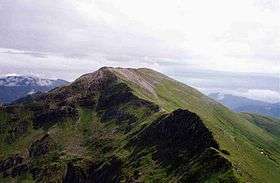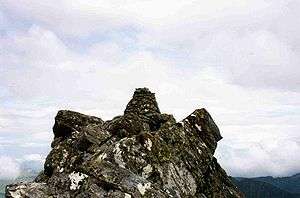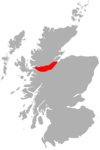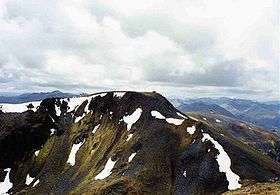Sgùrr a' Bhealaich Dheirg
| Sgùrr a' Bhealaich Dheirg | |
|---|---|
 Sgùrr a' Bhealaich Dheirg seen from Sàileag 2 km to the W. | |
| Highest point | |
| Elevation | 1,036 m (3,399 ft) [1] |
| Prominence | 311 m (1,020 ft) |
| Listing | Munro, Marilyn |
| Naming | |
| Translation | Peak of the Red Pass (Gaelic) |
| Pronunciation | Scottish Gaelic: [ˈs̪kuːrˠ ə ˈvjalˠ̪ɪç ˈʝeɾʲekʲ] |
| Geography | |
| Location | Kintail, Scotland |
| Parent range | Northwest Highlands |
| OS grid | NH035143 |
| Topo map | OS Landranger 33, OS Explorer 414 |

Sgùrr a' Bhealaich Dheirg is a Scottish mountain situated in Kintail on the northern side of Glen Shiel, 30 kilometres south east of Kyle of Lochalsh.
Overview
It is part of a group of three Munros (the other two being Aonach Meadhoin and Sàileag) known as the North Glen Shiel Ridge; they are also known as the “Brothers of Kintail” in contrast to the Five Sisters of Kintail which lie just to the west. Sgùrr a' Bhealaich Dheirg is the highest of the three Brothers with a height of 1036 metres (3399 feet). The mountain's name translates from Gaelic as “Peak of the Red Pass” but the Red Pass (Bhealaich Dheirg) is not marked on Ordnance Survey maps so its exact location is uncertain.
Topography
Sgùrr a' Bhealaich Dheirg is similar to the other Munros on the northern side of Glen Shiel in that it has extremely steep grassy slopes which descend into Glen Shiel, while to the north there are craggy coires and ridges. The southern flank of the mountain descends 850 metres in two kilometres to the valley floor: this steepness deters direct ascents of the mountain from the A87 road in the glen. There are also steepy grassy slopes to the east which descend to Coire nan Eun. The mountain is made up of four ridges. The main east - west ridge links with the adjoining Munros of Sàileag (west) and Aonach Meadhoin (east). There are two ridges which go northerly (north and north east) from the summit plateau and descend into the isolated country of the Kintail Forest.
Sgùrr a' Bhealaich Dheirg stands on the main east-west watershed of Scotland with drainage going to both coasts of the country. It has the distinction of having two sizable rivers rising from its northern corries. The River Croe which emerges from a small lochan called Loch a Glas Choire within the Glas Choire flows north west for 12 kilometres to join the sea at Loch Duich on the west coast. The River Affric rises in Coire nan Eun on the eastern flank of the mountain and flows some 80 kilometres to reach the east coast at the Beauly Firth. The steep southern slopes of the mountain are clothed in the trees of the Glenshiel Forest below the 450 metre contour.
Ascents and summit
As mentioned, the steepness of the southern slopes deter direct ascents of the mountain. It is possible to tackle the mountain from a starting point two kilometres west of the Cluanie Inn, going through the forest and ascending by a subsidiary ridge called Meall a’ Charra which joins the eastern ridge at the col with Aonach Meadhoin. The majority of visitors to the summit arrive along either the east or west ridges from the adjoining “Brothers” Munros. This traverse of all three mountains starts either at the Cluanie Inn to the east of the group, or from a parking place in Glen Shiel at grid reference NH009135 to the west. The starting and finishing point of this walk is several kilometres apart.
The Summit of Sgùrr a' Bhealaich Dheirg can come as a surprise to the walker with the highest point situated off the main summit plateau, 80 metres along the narrow north east ridge with a strange dry stone wall leading to it. It is an easy scramble to reach the well built summit cairn which commands good views of the mountainous country to the north.
References
- The Munros (SMC Guide) Donald Bennett et al., ISBN 0-907521-13-4
- Hamish’s Mountain Walk, Hamish Brown, ISBN 1-898573-08-5
- The High Mountains of Britain and Ireland, Irvine Butterfield, ISBN 0-906371-30-9
- 100 Best Routes on Scottish Mountains, Ralph Storer, ISBN 0-7515-0300-2
Footnotes
- ↑ "walkhighlands Sgurr a'Bhealaich Dheirg". walkhighlands.co.uk. 2014. Retrieved 9 January 2014.
Coordinates: 57°10′35″N 5°15′12″W / 57.1763°N 5.2532°W

